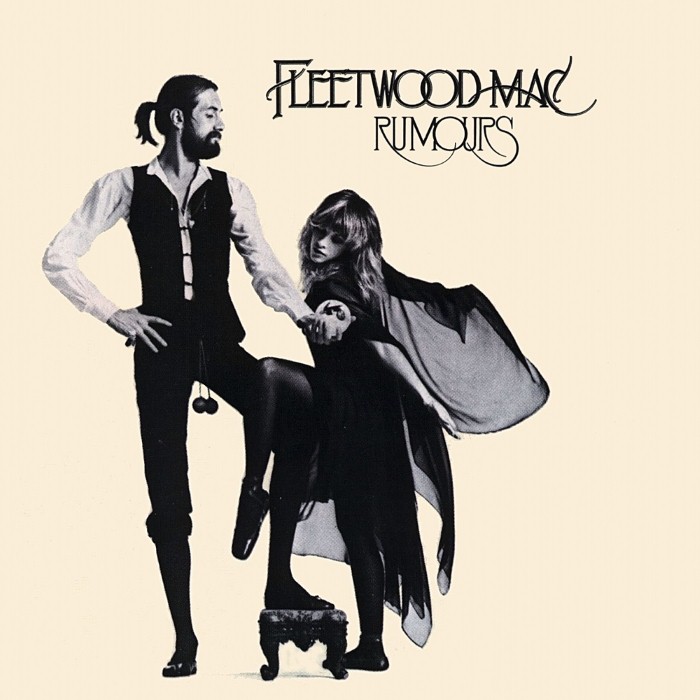Rumours by Fleetwood Mac

Rumours is the eleventh studio album by British-American rock band Fleetwood Mac. Largely recorded in California during 1976, it was produced by the band with Ken Caillat and Richard Dashut and was released on 4 February 1977 by Warner Bros. Records. The record peaked at the top of both the main United States Billboard chart and the United Kingdom Albums Chart. "Go Your Own Way", "Don't Stop", "Dreams", and "You Make Loving Fun" were released as singles. A Grammy Award winner, Rumours is Fleetwood Mac's most successful release with sales of over 40 million copies worldwide. The band wanted to expand on the commercial success of the 1975 record Fleetwood Mac, but struggled with relationship breakups before recording started. The Rumours studio sessions were marked by hedonistic behaviour and interpersonal strife between Fleetwood Mac members; these experiences informed the album's lyrics. Influenced by pop music, the record's tracks were recorded using a combination of acoustic and electric instruments. The mixing process delayed the completion of Rumours, but was finished by the end of 1976. Following the album's release in 1977, Fleetwood Mac undertook worldwide promotional tours. Rumours garnered widespread critical acclaim. Praise centred on its production quality and harmonies, which frequently relied on the interplay among three vocalists. The record has inspired the work of musical acts in different genres. Often considered Fleetwood Mac's best release, it has featured in several publications' lists of the best albums of the 1970s and the best albums of all time. In 2004, Rumours was remastered and reissued with the addition of an extra track and a bonus CD of outtakes from the recording sessions.
<b>100 Best Albums</b> To understand what made <i>Rumours</i> so impacting, you have to look at the music that came out around it. This was the era of the Eagles and Linda Ronstadt: artists who, like Fleetwood Mac, combined the intimacy of singer-songwriters with a softened take on rock ’n’ roll. But it was also the era of Boston, Foreigner, Pink Floyd and a wave of bands that scaled up the ambition of ’60s rock to blockbuster heights—stuff that parents who loved doo-wop and early Beatles records might not care about, but millions of teenagers would. Not to mention Barry Manilow and Neil Diamond, ABBA and the Bee Gees, and The Clash and Patti Smith—all of whom were totally different, but who collectively drove pop-rock to greater extremes of showmanship, polish and rebellion. And there, in the middle of the road, is <i>Rumours</i>. When they rock, they do it gently (“The Chain”), but with a bite that sets them apart from their adult-contemporary contemporaries (“Go Your Own Way”). And while they capture the carefree positivity of the good life (and the Baby Boomers living it), they don’t shy away from the pains it took to get there (“Don’t Stop”, “Dreams”). As beautifully as their musical personalities meld (the blues-raised rhythm section of Mick Fleetwood and John McVie, the romanticism of Christine McVie, pop perfectionism of Lindsey Buckingham and mysticism of Stevie Nicks), you can always hear them tugging gently on each other, an internal drama that’s all the more poignant given how restrained the final product is. Radical? No: In some ways, <i>Rumours</i> sounds like it doesn’t know the wilder developments of the late 1960s—psychedelia, experimental and progressive rock—even happened. But for an album that went on to sell more than 10 million copies, it’s tougher and more unsettling than it probably should be. The band has given plenty of interviews over the years attesting to how they strove to serve the song, no matter how painful or personal—which, in the context of Buckingham’s “Go You Own Way” or Nicks’ “Dreams”, must’ve been very, let alone John McVie backing up his newly ex-wife on a song about how fulfilled she is in her current relationship (“You Make Loving Fun”). Co-producer Ken Caillat remembers watching Buckingham and Nicks scream at each other during recordings, only to compose themselves just in time for the tape to start rolling. It’s a good metaphor: Even if you ignore the album’s soap opera (which included the implosion of three relationships, two of them between couples in the band), <i>Rumours</i> captures the pain of a band keeping it perfectly together while in the midst of falling apart.
